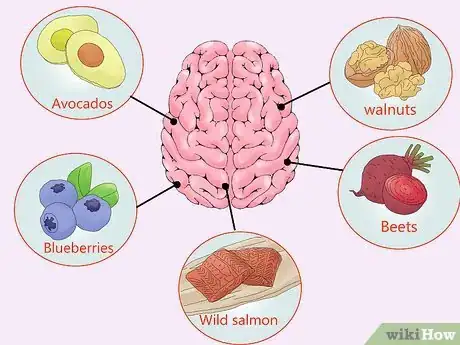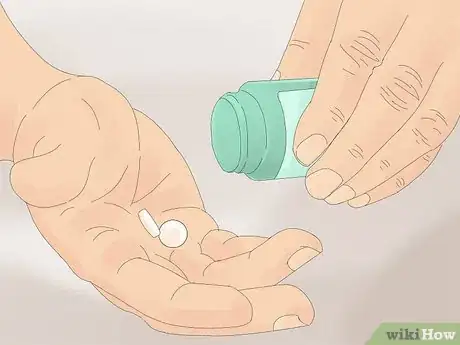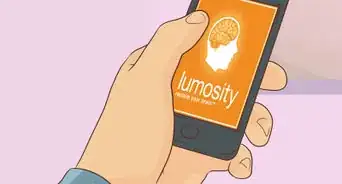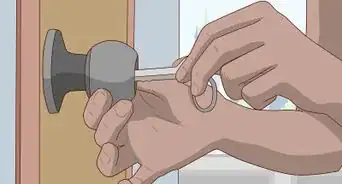This article was medically reviewed by Sarah Gehrke, RN, MS. Sarah Gehrke is a Registered Nurse and Licensed Massage Therapist in Texas. Sarah has over 10 years of experience teaching and practicing phlebotomy and intravenous (IV) therapy using physical, psychological, and emotional support. She received her Massage Therapist License from the Amarillo Massage Therapy Institute in 2008 and a M.S. in Nursing from the University of Phoenix in 2013.
There are 20 references cited in this article, which can be found at the bottom of the page.
wikiHow marks an article as reader-approved once it receives enough positive feedback. This article received 13 testimonials and 92% of readers who voted found it helpful, earning it our reader-approved status.
This article has been viewed 919,537 times.
Though computers are our closest analogue when it comes to discussing the human brain, increasing processing power in the brain is not as simple as plugging in a stick of RAM. When neurologists and neuroscientists talk about the processing speed of the brain, they’re referring to the rate at which a human can take in a new piece of information, reach a judgment about it, and formulate a response.[1] Based on this definition, the key to improving processing speed lies in making stronger connections in the brain, which allow brain signals to travel at higher speeds. Though most of this type of hardwiring of the brain occurs during childhood, you can still take action to sustain and even potential improve your brain’s processing speed.
Steps
Developing a Brain-Healthy Lifestyle
-
1Get plenty of aerobic exercise. What we think of as the brain’s processing speed is actually the ways in which electrical signals travel across axons, which are essentially the wiring connecting different parts of the brain. The white matter of the brain is made up of all of this wiring, and it is fed by blood vessels, meaning that vascular problems such as diabetes and high blood pressure can starve the axons of much-needed oxygen and glucose. Therefore, staying fit and getting plenty of aerobic exercise is the number one suggestion by most neurologists to sustain axons and even potentially improve processing speeds.[2] [3]
- A regular cardio routine has also been linked to an increase in the birth of new neurons in the hippocampus, which is a part of the brain important to learning and processing.[4]
-
2Eat the right foods. Physical health goes hand in hand with brain health. Along with the right amount of exercise, you should also maintain a balanced diet. You can additionally focus on specific foods linked to brain health, such as:[5]
- Avocados - Avocados are great at assisting in the prevention of vascular conditions, such as high blood pressure, and healthy blood flow is essential for a healthy brain. Avocados are high in fat, though, so limit yourself to a quarter or half an avocado a day.
- Blueberries - Blueberries are packed with antioxidants, which means they protect the brain from oxidative stress and may reduce the effects of age-related conditions. Aim for one cup of blueberries per day. Other great antioxidant-rich foods include pomegranate juice and dark chocolate.[6]
- Wild salmon - Omega-3 essential fatty acids, such as DHA, are essential for brain function. Deep-water fish such as salmon, sardines, and herring are full of them. Aim to eat a four-ounce serving two-to-three times per week.[7]
- Nuts and seeds - Nuts, especially walnuts, and seeds are a great source of vitamin E, which helps to fight cognitive decline as we age. Try to add one ounce a day.[8]
- Beets - Beets can increase blood flow to the brain, which may help improve your cognition. You can eat beets in a salad or drink beet juice.[9]
Advertisement -
3Get the proper amount of sleep each night. The National Institutes of Health recommend that adults get approximately seven-to-eight hours of sleep every night and that teenagers get nine hours. The brain forms new pathways while you sleep, and studies have shown that getting the right amount of sleep helps with learning, problem-solving skills, and memory. Sleep also plays a role in the body’s repair of the heart and blood vessels, which fuel the white matter of the brain.[10] >
- Sleep deficiency—even losing just 1-2 hours across several nights—can have an effect on reaction time and processing time, with studies showing that people take longer to finish tasks.[11]
- Long-term sleep deficiency has also been linked to vascular problems such as diabetes, heart disease, and high blood pressure, all of which can lead to depriving axons in the brain of oxygen and glucose.[12]
-
4Try nootropics. Nootropics are over-the-counter supplements that aim to improve brain function. These "smart drugs" may be able to increase focus, attention, memory, and motivation. Some popular nootropics include:[13]
- Bacopa Monnieri (Brahmi plant extract)
- L-theanine
- Racetams
- Artichoke extract
- Ginseng
-
5Keep learning. Well into adulthood, the brain continues making new connections. Learning a task builds new connections and mastering those tasks actually strengthens the connections in a way that makes the information travel across axons more quickly.[14] More specifically, when you learn, types of brain cells called glial cells can form sheaths of protein and fatty substances (called myelin sheaths) around axons that insulate the axons and subsequently speed electrical signals down them.[15]
- Learning new skills can both increase myelin sheaths as well as form sheaths around formerly bare axons.
- Thicker myelin sheaths can improve a number of brainy tasks from reading to creating memories to decision-making.[16]
-
6Start playing an instrument. Some studies have shown that taking up an instrument is another way of developing strong connections across different areas of the brain. The belief is that because musical training involves so many specific coordinations —visual to read music, auditory to listen to what you’re playing, and motor to finger the instrument—the connections between these brain areas become stronger and more tightly connected.[17]
- The group showing the largest gains from musical training were children who began before the age of seven; however, even adult musicians showed some impact on executive functions, which are the high-level functions that allow people to process and retain information quickly, amongst other things.[18]
-
7Maintain social networks. Not necessarily the online variety, but maintaining an active social life is actually good for your cognitive abilities.Lively discussion necessitates quick thinking and maintaining strong social networks is a great way to challenge yourself mentally and keep you on your toes.[19]
-
8Stop smoking. If you don’t smoke, then don’t start. If you currently smoke, then you should quit. Beyond what smoking means for your risks of cancer and emphysema, it has also shown in studies to decrease overall brain volume, especially in the hippocampus.Smokers lose brain volume faster than nonsmokers, which can have an effect on cognitive ability.[20] [21]
Trying Brain Games
-
1Enlarge this picture by opening it in a new window. Simply put, the science is still out on brain games. When put to rigorous, short-term scientific trials, brain games sometimes show an effect on cognitive ability and sometimes do not.[22] The rise in popularity of brain games is also too new for any long-term studies of the method to have shown results one way or another. Anecdotally, many people do feel as though brain games have helped with cognition, so here is an example of an increasingly demanding brain game you can try if you choose. Begin by opening a large, clear version of this image.
-
2Call out the direction the eyes are looking. Starting at the top, move from left to right and top to bottom while calling out the direction the eyes are looking, e.g. ”down, left, up, right…” Time yourself as you go through the faces, and try to do it without any errors first within thirty seconds, then within fifteen seconds.
-
3Start over from the face’s perspective. Once you’ve gotten quick at calling the directions, try calling the directions from the face’s perspective instead—as if you were the face looking out from the page, e.g. ”down, right, up, left…" This approach is more difficult because it requires one additional processing step to correct for the face’s perspective.
- As with the first trial, time yourself and try to complete the picture without error at different milestones—thirty seconds, then fifteen seconds.
-
4Go back to the first exercise but include finger pointing. Return to the exercise from step 2, but this time point your finger in the opposite direction of the one you’re saying aloud for each face, e.g. ”down [point up], left [point right], up [point down]…" This one will be even more difficult because you’ve added a motor skill component to the verbal component.
- Similar to the idea behind why musical training can improve processing speed, this exercise requires the coordination of multiple brain modalities—visual to interpret the information in the picture, verbal to say the direction aloud, and motor to point in coordination with the rest.
- You can continue adding even more components to the exercises as well, calling out the face’s perspective direction only when you reach green faces or on every third face, as examples. By adding different rules to the exercise, you reduce your dependence on simply memorizing the order to reduce your time and errors.
-
5Expand your repertoire of brain games. This is just one example of a brain game. There are many websites dedicated to timed games for reasoning, memory, and processing speed. You can also find a variety of word games and logic puzzles online that are aimed at exercising one’s cognitive abilities.
- Luminosity, Brainist, Fit Brains, and Games for the Brain are all examples of websites dedicated to brain training.
- Outside of websites, you can also find brain-training app games for your mobile devices and games such as Brain Age for the Nintendo DS.
Expert Q&A
Did you know you can get expert answers for this article?
Unlock expert answers by supporting wikiHow
-
QuestionHow can I improve my critical thinking?
 Sarah Gehrke, RN, MSSarah Gehrke is a Registered Nurse and Licensed Massage Therapist in Texas. Sarah has over 10 years of experience teaching and practicing phlebotomy and intravenous (IV) therapy using physical, psychological, and emotional support. She received her Massage Therapist License from the Amarillo Massage Therapy Institute in 2008 and a M.S. in Nursing from the University of Phoenix in 2013.
Sarah Gehrke, RN, MSSarah Gehrke is a Registered Nurse and Licensed Massage Therapist in Texas. Sarah has over 10 years of experience teaching and practicing phlebotomy and intravenous (IV) therapy using physical, psychological, and emotional support. She received her Massage Therapist License from the Amarillo Massage Therapy Institute in 2008 and a M.S. in Nursing from the University of Phoenix in 2013.
Registered Nurse
-
QuestionHow do I improve my brain's processing speed?
 Sarah Gehrke, RN, MSSarah Gehrke is a Registered Nurse and Licensed Massage Therapist in Texas. Sarah has over 10 years of experience teaching and practicing phlebotomy and intravenous (IV) therapy using physical, psychological, and emotional support. She received her Massage Therapist License from the Amarillo Massage Therapy Institute in 2008 and a M.S. in Nursing from the University of Phoenix in 2013.
Sarah Gehrke, RN, MSSarah Gehrke is a Registered Nurse and Licensed Massage Therapist in Texas. Sarah has over 10 years of experience teaching and practicing phlebotomy and intravenous (IV) therapy using physical, psychological, and emotional support. She received her Massage Therapist License from the Amarillo Massage Therapy Institute in 2008 and a M.S. in Nursing from the University of Phoenix in 2013.
Registered Nurse
Warnings
- Generally speaking, the scientific community still requires more studies of brain games to determine if they’re truly helpful and why.⧼thumbs_response⧽
References
- ↑ http://www.scientificamerican.com/article/what-causes-the-brain-to-have-slow-processing-speed-and-how-can-the-rate-be-improved/
- ↑ http://www.scientificamerican.com/article/what-causes-the-brain-to-have-slow-processing-speed-and-how-can-the-rate-be-improved/
- ↑ https://www.psychologytoday.com/blog/the-athletes-way/201401/what-is-the-best-way-improve-your-brain-power-life
- ↑ https://www.pnas.org/doi/abs/10.1073/pnas.1015950108
- ↑ https://www.health.harvard.edu/healthbeat/foods-linked-to-better-brainpower
- ↑ https://www.acs.org/content/acs/en/pressroom/newsreleases/2016/march/blueberries.html
- ↑ http://scienceline.org/2014/03/why-is-salmon-good-for-your-brain/
- ↑ http://jn.nutrition.org/content/144/4/561S.long
- ↑ http://news.wfu.edu/2010/11/03/benefits-of-beet-juice/
- ↑ https://www.ncbi.nlm.nih.gov/pmc/articles/PMC2656292/
- ↑ https://www.health.harvard.edu/blog/little-sleep-much-affect-memory-201405027136
- ↑ https://www.nhlbi.nih.gov/health/sleep-deprivation
- ↑ https://www.ncbi.nlm.nih.gov/pmc/articles/PMC5021479/
- ↑ https://student.societyforscience.org/article/learning-rewires-brain
- ↑ https://student.societyforscience.org/article/learning-rewires-brain
- ↑ https://www.ncbi.nlm.nih.gov/pmc/articles/PMC6252314/
- ↑ https://www.npr.org/templates/story/story.php?storyId=5028224
- ↑ https://www.psychologytoday.com/blog/the-athletes-way/201406/does-playing-musical-instrument-make-you-smarter
- ↑ https://systematicreviewsjournal.biomedcentral.com/articles/10.1186/s13643-017-0632-2
- ↑ https://www.alzheimersresearchuk.org/blog/how-quitting-smoking-could-be-the-next-step-you-take-for-better-brain-health/
- ↑ https://pubmed.ncbi.nlm.nih.gov/28622625/
- ↑ http://news.fsu.edu/news/health-medicine/2017/04/17/think-brain-games-make-smarter-think-fsu-researchers-say/
About This Article
To increase your brain's processing speed, make sure you're getting plenty of aerobic exercise since it can improve the flow of blood to your brain. Also, eat a balanced diet that's rich in foods linked to brain health, like avocados, blueberries, wild salmon, and nuts. In addition to exercising and eating healthy, make sure you're getting 7-9 hours of sleep every night since even just 1 hour less of sleep can impact your brain's processing speed. You can also try taking over-the-counter supplements, called nootropics, to increase your focus, attention, and memory. To learn how to use brain games to improve your brain's processing speed, scroll down!













































































Medical Disclaimer
The content of this article is not intended to be a substitute for professional medical advice, examination, diagnosis, or treatment. You should always contact your doctor or other qualified healthcare professional before starting, changing, or stopping any kind of health treatment.
Read More...